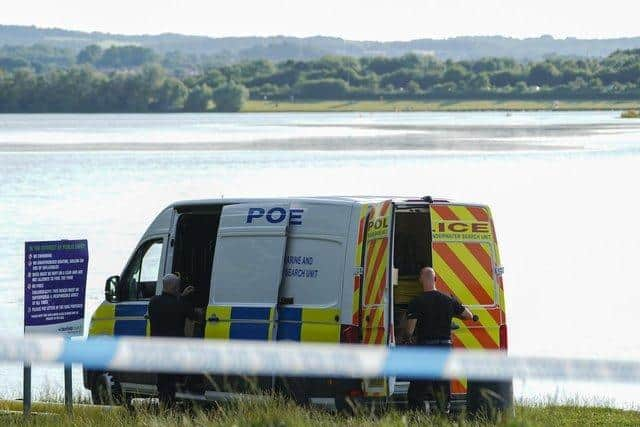Emergency services warn of dangers of entering water as body pulled from West Yorkshire park
and live on Freeview channel 276
Tragically, eight people are now reported as having drowned on Sunday according to Mountain Rescue England and Wales, the hottest day of the year so far.
Seven of these drownings occurred in inland waterways, it has been reported.
Advertisement
Hide AdAdvertisement
Hide AdThe body of a man was recovered at Pugneys Country Park, following a two-day search of the lake.


Fire and rescue teams, police, paramedics and specialist water search teams were deployed to the scene to search for the man.
Councillor Michael Graham Wakefield Council’s Cabinet Member for Culture, Leisure and Sport, said: "This tragic incident is a stark reminder of the very real dangers of swimming in open water.
"We ask everyone to keep themselves safe and urge people not to swim in places that are not specifically created for swimming.”
Advertisement
Hide AdAdvertisement
Hide AdThe body of a man in his 50s was recovered from the River Ouse, close to the Water End Bridge in York on Sunday evening, while a man’s body was also pulled from the lake at Crookes Valley Park in Sheffield just before midnight on the same day.


Now, multiple emergency services and organisations have urged the public to realise the dangers of entering the water.
Over 60% of drownings are of people who have ended up in the water by accident.
Jackie Roberts, from Wetherby, sadly lost her daughter in 2014.
Advertisement
Hide AdAdvertisement
Hide AdSince her daughter Megan, 20, was found drowned in the River Ouse in York, Jackie has dedicated her life to raising awareness of the dangers of water and alcohol.


She became a volunteer ambassador for the Royal Life Saving Society, before taking up a post as national drowning prevention officer, fund-raising, securing drowning prevention on the political agenda and fronting media campaigns.
Speaking to the YEP on Tuesday following the reports of the deaths in our region, Jackie urged the public to read about the effects of 'cold water shock' and be careful.
Jackie retrained as a drowning prevention officer for the charity the Royal Life Saving Society following the death of her daughter.
Advertisement
Hide AdAdvertisement
Hide AdShe said: "This time of the year people think 'lets go and cool off'.
"I have noticed a lot of people locally on Facebook and social media talking about open and wild water swimming, which is great if you know what you are doing.
"However, there are countless people who are not aware of the risks and they can get into very serious problems."
Jackie said she had seen an increase in awareness of the risks in recent years due to successful organisation and media campaigns.
Advertisement
Hide AdAdvertisement
Hide AdShe added: "A lot of work has been done by the media and charities.
"More people are now aware of cold water shock."
The term ‘cold water shock’ refers to a range of natural reactions which our bodies take to combat cold water, the Royal Lifesaving Society UK said.
Their website states: "There are three stages that your body goes through during cold water shock, starting with one that you will be familiar with a mild version of from getting into the swimming pool…a gasp for breath, this is then followed by rapid breathing (hyperventilation).
"At the same time as your breathing goes out of control, your blood pressure shoots up as your body tries to keep your blood warm by moving it towards the middle of your body (this is why you go pale when you’re cold).
Advertisement
Hide AdAdvertisement
Hide Ad"Once your breathing is back under control, this is your window to get out of the water before the further effects of cold water shock kick in.
"As your muscles cool, your strength, endurance and muscle control reduces to the point when you can’t swim any longer so can’t rescue yourself.
"The point at which you can’t swim any more is called ‘swim failure’, and if you haven’t got out of the water or managed to get hold of a buoyancy aid (like a lifejacket) by this time, you will drown."
What should you do if you fall into the water? - advice from the Royal Life Saving Society
Advertisement
Hide AdAdvertisement
Hide AdFirst, keep your mouth away from the water until you have your breathing back under control, you can do this by rolling onto your back and floating or paddling to stay at the surface.
Then, don’t waste any time and swim towards an exit before your muscles start to cool, or swim towards something that will help you to stay afloat whilst you are calling for help.
Finally, once you are out of the water re-warm yourself as soon as you can to avoid hypothermia.